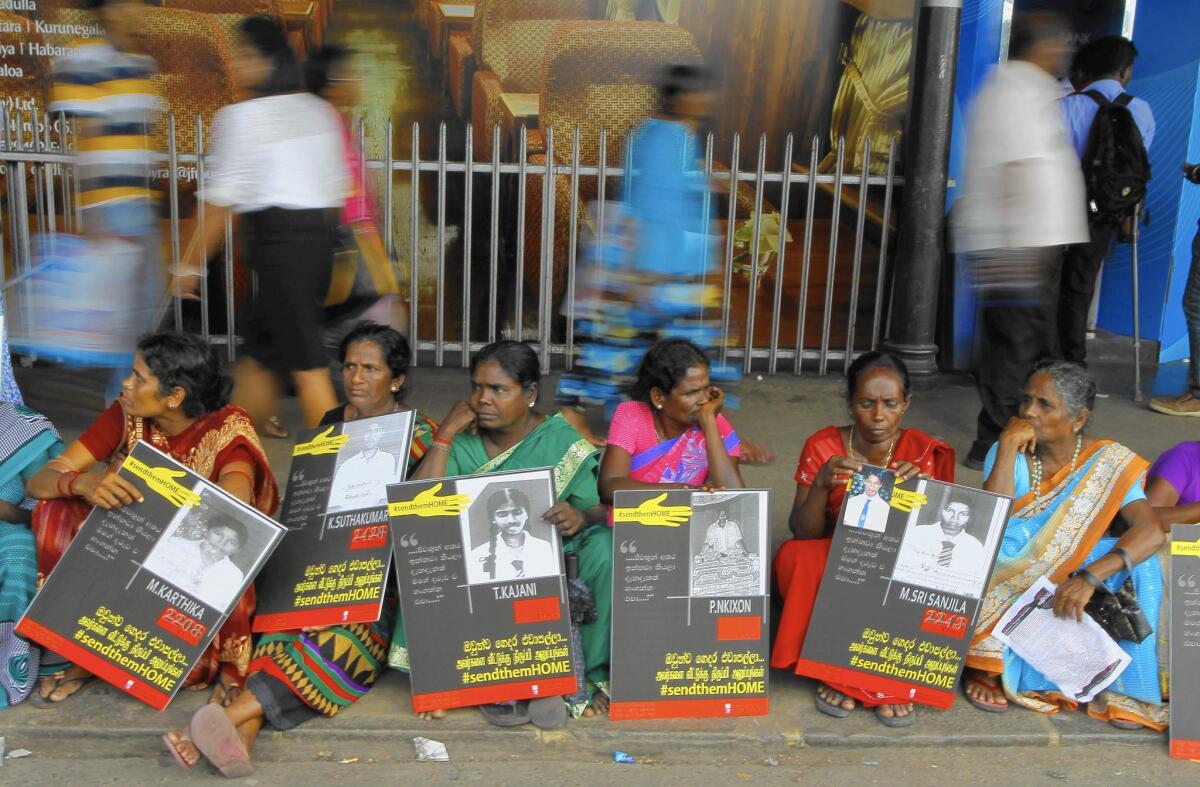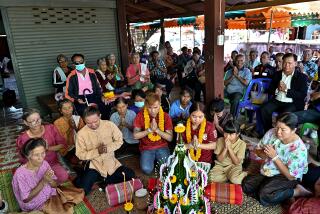6 years after war, Tamil families want to know where their loved ones are

- Share via
Reporting from Kilinochchi, Sri Lanka — Kuhendran Manoranjithamalar and her husband trudged into the army checkpoint on the last day of the Sri Lankan civil war, clutching their three children and some jewelry. They had lost everything else.
Then, as they sought refuge in government territory, they lost each other.
Soldiers detained her husband, Balasingham, a sometime driver for the defeated Tamil Tiger rebels. He has not been heard from since that warm evening in May 2009, joining thousands of ethnic Tamils who disappeared into Sri Lankan military custody in one of the largest roundups of wartime prisoners in recent memory.
“I have been through six years of hell,” she said recently, sitting outside her rebuilt concrete home in the northern town of Kilinochchi.
Now, for the first time, Manoranjithamalar has hope of learning what became of him. The authoritarian government that ordered the detentions — and is blamed for mass atrocities at the end of the 26-year war — was unseated at the polls in January and the new leadership has promised to set prisoners free and address the conflict’s gravest abuses.
“All I want is to hear that he’s alive,” said Manoranjithamalar, 41.
Tens of thousands died in fighting across the northern tip of this South Asian island nation, where the Tigers waged a ruthless quest for an independent state for minority Tamils.
After the war, Tamils endured an extended nightmare of forced disappearances, land seizures and de facto military rule by then-President Mahinda Rajapaksa’s government, which was dominated by the Sinhalese majority.
The first moves by the new president, Maithripala Sirisena, blew in like an Indian Ocean breeze.
Sirisena, a soft-spoken former health minister, appointed a civilian to replace the northern region’s military governor, along with a Tamil chief justice of the supreme court. He also announced plans to return land taken by the military for vague security reasons, a policy that left thousands of Tamils moored in temporary camps.
Perhaps most welcome was the news that officials were compiling a list of political prisoners being held without charges, with an eye toward speeding up releases. And in a closely watched case, a Tamil activist jailed last year for campaigning to free missing people was freed on bail.
“There’s a huge opening, a huge sense of relief,” said Ahilan Kadirgamar, an economist based in the northern town of Jaffna.
Yet the government has not released details or a timetable for setting people free. Part of the challenge, say officials familiar with the matter, is that no one seems to know how many prisoners remain in custody, and how many were killed by security forces.
In 2010, the International Commission of Jurists, an advocacy group, said Sri Lankan authorities were holding about 8,000 people in “what may be the largest mass administrative detention anywhere in the world.” Toward the end of his decade in power, facing growing pressure to account for the prisoners, Rajapaksa appointed a commission on the missing; it has received 20,000 complaints, including 5,000 involving soldiers and police officers.
Many of the civilian detainees were suspected former members or associates of the Tamil Tigers, like Balasingham, the driver, who surrendered or were captured by army forces. Some were abducted from city streets by anonymous squads riding in unmarked white vans, a phenomenon that continued for years after the war.
Thousands of suspected rebels went through military rehabilitation camps and were let go. An unknown number probably were killed; videos from the end of the war have surfaced showing Sri Lankan soldiers shooting Tiger prisoners, naked and bound, in the back of the head.
What gives families a sliver of hope are the rumors — never confirmed — of secret army-run jails still holding hundreds of detainees.
“Every so often, someone is released from such a place after two to three years and they don’t get even a small piece of paper saying where they have been,” said Suresh Premachandran, president of the opposition Tamil National Alliance. “The military can completely deny it, and at the same time they tell the person that if you open your mouth, you will be no more.”
One former rebel in Kilinochchi who was put through a rehabilitation camp in 2009 said he saw multiple buses leave the camp carrying prisoners he knew, who have not been heard from. The man requested anonymity and declined to share the location of the camp because he feared reprisals by security forces.
Health Minister Rajitha Senaratne, a government spokesman, said fewer than 300 people were being held without charges. Though investigations are not complete, he believes that “nobody is secretly detained.”
“Either they have been released, they have gone abroad or they are dead,” he said.
An estimated 45,000 households in the north are headed by women whose husbands have been killed, jailed or are missing. Some of the men were forcibly conscripted into the rebel army; others had only tenuous links to the Tigers’ ruthless, decades-long quest for an independent northern state.
Toward the end of the war, Tigers in Kilinochchi ordered Manoranjithamalar’s husband, an experienced truck driver, to begin ferrying supplies and fighters. Balasingham never picked up a weapon, she said, but he was sympathetic to the rebel cause; his father had been killed by Indian forces years earlier during their brief, disastrous foray into the war against the Tigers.
In late 2008, with Sri Lankan soldiers advancing on Kilinochchi, the Tigers’ capital, a tank shell flattened their home. They joined an exodus of Tamil families toward swampy eastern coastal areas that the army declared to be no-fire zones — until it shelled those as well. The United Nations believes as many as 40,000 civilians were killed in the final months of the war.
One attack killed Balasingham’s mother in early 2009. Then that May, days before the Tigers surrendered, a shell killed Balasingham’s brother outside a bunker where the family had sought shelter near a makeshift hospital.
“When we got to the army checkpoint, we had nothing,” Manoranjithamalar recalled. “Even our clothes, we had borrowed from other refugees.”
Promising to “forgive” those who turned themselves in willingly, soldiers took away Balasingham while she and the children, the youngest 3 years old, were taken to an internment camp along with thousands of Tamils. When they were released weeks later, she had lost all trace of him.
She has since visited every police station, advocacy group and rehabilitation camp she can think of. She and a dozen others who had lost their husbands pooled their money to hire a Sinhalese man to travel with them to Colombo, the capital, to knock on doors at government offices.
None of the efforts brought answers. Police investigators have in turn told her they are searching for Balasingham and have poked around her home, accusing her of hiding him.
“I don’t know what game they are playing,” she said, her hands fidgeting as mosquitoes buzzed around a bare lightbulb on her veranda.
Tamil leaders say Sirisena’s government has not fulfilled pledges to withdraw security forces from the north, where soldiers still watch over public sites and counter-terrorism police patrol towns and villages on bicycles. Sirisena has not said whether he will repeal a controversial anti-terrorism law that activists say is being used to detain hundreds of Tamil prisoners without charges.
With U.S. support, Sri Lankan officials in February persuaded a U.N. panel to delay a report on war crimes that could implicate Rajapaksa and his brother Gotabhaya, the former defense minister. Government officials argued that the report could embolden Rajapaksa’s Sinhalese nationalist supporters before parliamentary elections scheduled for June.
Though Sirisena’s initial agenda focuses on corruption and political reforms, “there is nothing in it about accountability for war crimes or solving the Tamils’ problems,” said Father S.V.B. Mangalarajah, a priest with the Diocese of Jaffna.
Harsha Da Silva, deputy minister for policy planning and economic development, said the government had taken “concrete steps” to address Tamil grievances.
“We need a little time to show the country that we are going to implement what we promised, that our intentions are genuine and we really are attempting to create a sustainable peace in this country,” Da Silva said.
Tamil groups have staged demonstrations across the north, demanding swifter action on the missing. Manoranjithamalar has preferred to stay quiet, banishing the thought that sometime over the last six years, the worst had happened to Balasingham.
“I gave him to the army alive,” she said, fighting back tears. “I expect them to release him alive.”
Twitter: @SBengali
More to Read
Sign up for Essential California
The most important California stories and recommendations in your inbox every morning.
You may occasionally receive promotional content from the Los Angeles Times.











